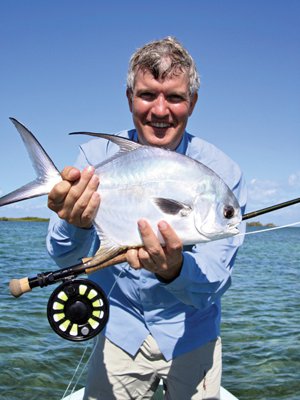 |
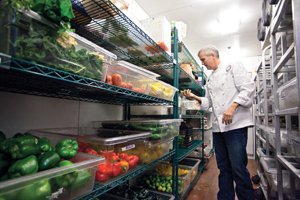 |
| Bonnell believes that a chef should utilize local farmers and ranchers for the freshest products possible. This is evident in his restaurants with menu items that change seasonally. |
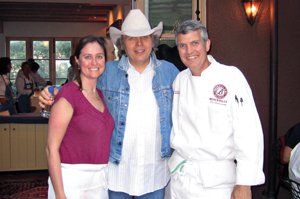 |
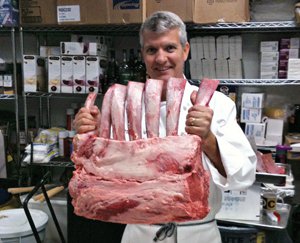 |
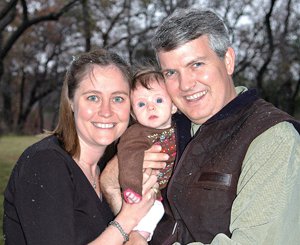 |
| Bonnell works hard to balance work life, family life and his hobbies of fishing, hunting and running in races. |
.jpg.jpe) |
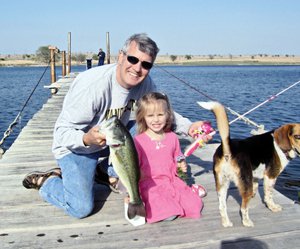 |
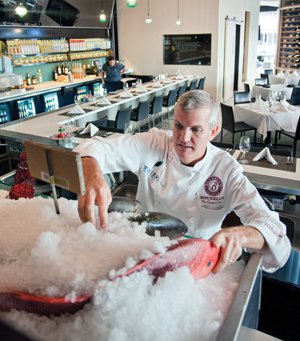 |
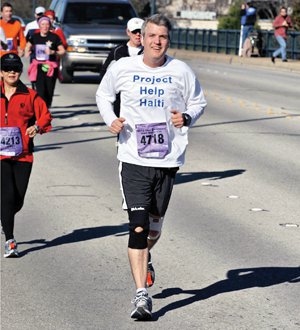 |
.jpg.jpe) |
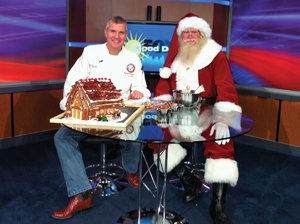 |
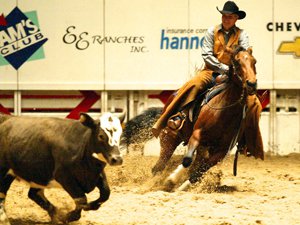 |
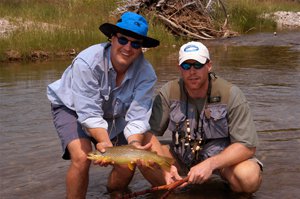 |
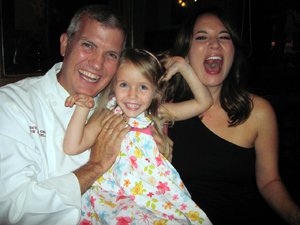 |
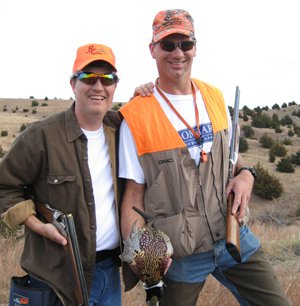 |
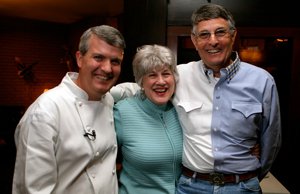 |
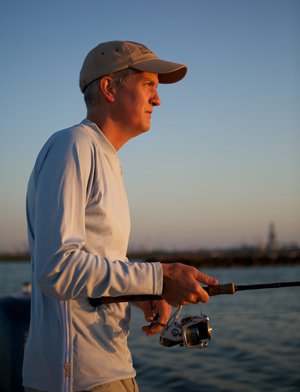 |
At 24 years old, Jon Bonnell was single, living alone with his dog in Dallas where he chose to embark on a teaching career, having just graduated from the prestigious Vanderbilt University. He was restless and depressed. The fourth-generation Fort Worth native had been diagnosed with attention deficit syndrome. Teaching high school and middle school math and science wasn't high stimulus enough for him, he says, and the three-month summer vacations with nothing to do were killing him.
"When we started studying attention deficit disorder in college, I thought, "This is the story of my life." Always jumping from hobby to hobby to hobby," says Bonnell, now 43, while seated on a leather loveseat in the waiting area of his namesake restaurant, Bonnell's Fine Texas Cuisine. "And just the way I'm talking now. I know what's going on behind me; we just got a reservation for 10. I can hear it all going on at once. My brain works that way and it really works well for the restaurant industry."
He quips with a smile, "But man, to have that three months off now."
Today Bonnell's life is far from stimulus-free. With two small children, two fine dining restaurants, two published cookbooks, countless culinary accolades and national TV appearances, and a recent Ironman competition finish under his belt, the Fort Worth chef has used what could have been a hindrance as a means to achieve the unattainable, he says.
Discovering His Destiny
"When I was a teacher, I actually specialized in teaching kids who had ADD," Bonnell says. "My whole goal was to figure out how to show these kids that it's not a detriment, and it can really be a positive in some areas."
Bonnell realized he was destined for the fast-paced restaurant world after becoming infatuated with cooking shows on PBS as well as a brand new show called The Essence of Emeril, which had just launched on the new Food Network. The young teacher, whose long-term plan included obtaining a masters degree to become a principal, had an epiphany.
"I thought, "Wait a minute. All I ever do is watch cooking shows and cook for other people. I cook like crazy,"" he says. "It never had occurred to me in my life that there was a school for chefs. In my family, you go to high school and you go to college. Culinary school wasn't on the table. I had never thought about it."
Phone calls to culinary schools to obtain brochures resulted in advice for Bonnell to get experience first in an actual restaurant during his next dreaded summer off. Having visited the executive chef in person, he was given a job on the spot at a new Dallas restaurant called Mediterraneo.
"I had no idea what I was doing. I walked in and didn't have the right clothes, the right shoes…I didn't have anything," he says.
Plating desserts and learning how to torch crème brulees were Bonnell's duties for his first Saturday night.
"I was in as deep of weeds as I could be, just trying to plate desserts, but I loved it. I wasn't doing much cooking, but I was in the mix," he recalls. "You got to work at 2:30 in the afternoon, and you were off at midnight. You were working a full dinner shift, seeing what it's like to put out 250 covers on a busy Saturday night as fast and as hard as you can go, watching the one guy on the grill and the one guy on sauté. I just thought, this is for me."
Realizing how challenging it was to run an entire kitchen after his short experience of simply plating desserts, Bonnell was inspired, motivated like never before to pursue a career path that would keep him fulfilled.
"It was like an Ironman," he says. "It seemed almost unattainable."
Fort Worth Farm-to-Table
Bonnell attended the New England Culinary Institute in Montpelier, Vermont, a small town that's long been sprinkled with local farmers markets.
"I really fell in love with the fine dining approach where you utilize your local farmers and ranchers and celebrate the products they have, rather than the bar and grill style where you order the least expensive products," Bonnell says. "I thought, "This is how you do it right. You celebrate what's in season.""
Gravitating toward the smaller, chef-driven restaurant concept, Bonnell set a goal of opening his own eatery one day, despite warnings that his fine dining farm-to-table idea would never work. Bonnell's Fine Texas Cuisine opened in 2001 and can be considered Fort Worth's first farm-to-table restaurant, because Bonnell has been sourcing produce, cheeses and wild game from local farmers and ranchers since day one, years before it was trendy to do so.
Bonnell's love of wild game, which is prominent on his menu in the form of venison, quail, elk and buffalo, stems from his lifetime of hunting with his brother, a local physician, and his father, a retired dentist.
"The outdoors is just something that has been a part of me my whole life," Bonnell says, "The first food I learned how to cook was wild game. My mom had a deal where first Monday of every month was "kids cook night." I remember cooking with mom from start to finish at an age before I could really read."
Diving Into New Waters
After more than a decade of serving the fine Texas cuisine he's become nationally known for, Bonnell was ready to go coastal. His love of fishing drove his desire to open a seafood destination, a seaside version of Bonnell's.He opened Waters: Bonnell's Fine Coastal Cuisine one year ago to the delight of his loyal customers who longed for more of his presence in Fort Worth. Essentially fishing from his cell phone by talking to fishermen around the country, Bonnell is having a blast.
"I can always buy ribeyes or Kobe beef or elk or buffalo, but the fish game changes every hour," he says. "It's fun to make relationships with guys who run a small, family-owned boat. They'll call on the way back to the dock and say, "Here's what I have." So I buy inventory that is from the shore to my door in less than24 hours. That, to me, is the most fun thing about seafood."
So far, Fort Worth diners have responded well to Waters, even to some of the more exotic fish Bonnell showcases as daily specials. (He keeps safe bets like rainbow trout and redfish on the menu for the less adventurous.)
But not everyone was pleased with his highly anticipated new venue. After a scathing, one-star review from the Dallas Morning News last summer that generated big talk on social media, Bonnell was shocked, confused and dejected.
"I read it and…your heart just sinks," he says. "I immediately wondered if I offended somebody or personally did something wrong. I sent it to my guys in the kitchen and said, "Let's talk tomorrow. Keep your chins up. We make a lot of people happy. We can't satisfy everybody." "
He had a conversation with the critic, who used words like "clobbered," "assaulted" and "hijacked" to describe cooking and plating techniques in the review. Bonnell says he was told hammering chefs was the writer's style but, despite the disdainful review, the writer had a great time and would return. Playing to the critic game is not something Bonnell is interested in.
"I don't constantly try to figure out, OK, which food critics are coming in? Who's where and what do they look like?" Bonnell says. "Life's too short. We try to do the best we can every day and not play games with it. Yes, it hurts me and my family and the people that work for me that feel like family, and it bothers me. But you know what? There are still people who want to come in and eat, and our job is to give them the best experience possible."
Egomaniacs
Bonnell admits that executive chefs, who hold the highest rank in the kitchen, have a deservedly bad reputation for being arrogant egomaniacs. It's an image that repulses him and one he strives not to reflect.
"I specifically try to be the opposite of the Gordon Ramsey approach," he says. "The screaming; the yelling. I worked under a lot of that in a ton of kitchens. I was always so nervous, and I didn't want to run a kitchen or a business that way. I can't imagine running a kitchen where you belittle people just for the sport of it."
Bonnell's refreshing method of avoiding all of the culinary chest-thumping that many chefs thrive on is part of what makes him so likeable. He says he rarely tunes into the Food Network anymore because of the pompous, judgmental image many shows portray of chefs. He even gave up on his Twitter account last year, calling it too egocentric for him and saying, "Life is too short for that much social media."
"Trying to keep up with Facebook and Twitter was taking up a large portion of my day, more than I was willing to give," he says. "I bet Instagram is really fun. I'm not doing it."
Even the word "followers," which refers to the number of folks signed up to see what a Twitter account holder has to say, is unsettling to the spotlight-shy Bonnell.
"Don't get me wrong. It's really fun to do shows like Good Morning America and the Today Show, but, to me, it's just like, I can't believe they care what I'm cooking. It's such a hoot," he says. "So many chefs have just taken themselves too seriously. Do we deserve that status? It's hard to say. It is a very high-pressure environment. You're always under the gun. Everybody wants more work out of you in less time, and it's got to be perfect and it's got to be now. It's tough. It draws strong personalities. But, we're not curing cancer. We're not saving kids" lives."
Next for Bonnell
Bonnell is far from restless these days as he still makes time to teach cooking and wine classes and can still be booked as a personal chef while he balances working lunch at one restaurant and dinner at the other. He also periodically checks in on Buffalo Bros Pizza, Wings & Subs, a casual eatery he co-owns near Texas Christian University.
Bonnell took up running five years ago in an attempt to lose weight, as a new wardrobe in a larger size was not on his agenda. Thin all of his life, Bonnell says being in the eating and drinking business caught up with him. He is now addicted to hitting the trails, he says. He runs his two-year-old to school in a jogging stroller and has run as many as 30 races a year. In September, he completed a brutal Ironman triathlon in Lake Tahoe amid sub-freezing temperatures and high altitudes. Bonnell says he'll keep running (an Olympic distance race is next on his list) but neither another Ironman nor another fine dining restaurant is left in him, for now.
"I feel like if I can spend equal time at both restaurants, I can be effective and still take time to go by the customer's table, still teach culinary school, still teach wine classes and still manage everything," he says. "I don't want six restaurants across the Metroplex. I want restaurants to have my name on them and my face behind them. I like to go up to people on their anniversary and say, "Man, it's great to see you, and I am honored you chose us," and mean it. If we ever get to the point where people start saying, "Well, he's just never even there," then we're not doing it right. This is as far as we want to go."
It's that dedication that has made Bonnell successful. He has remained grounded throughout, which, in a society where chefs are becoming as swaggering as A-list celebrities, is why Fort Worth seems to love him so much.

